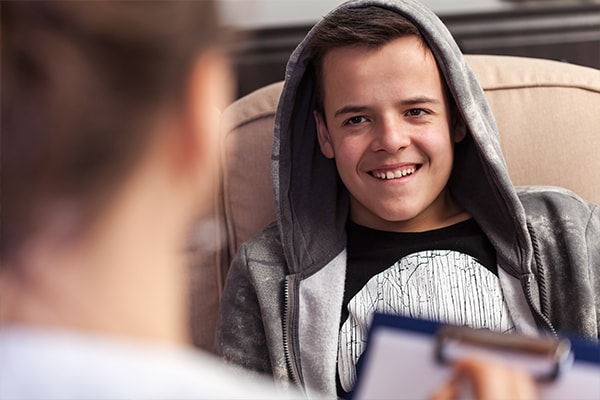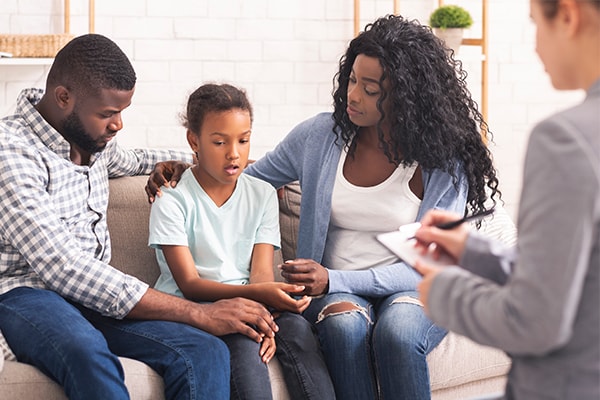Guide to Child Therapy
As a parent, you may not always have all the tools to provide the support that your child needs. Whether triggered by a life event or by different mental health concerns that arise, parents don’t have to handle it alone.
- 4 min read
- health & wellness

As children grow up, they encounter different scenarios and learn how to manage them. They use parents and other people in their lives to understand how to deal with different emotions. Their parents and other adults become their primary source of support. As a parent, you may not always have all the tools to provide the support that your child needs. Whether it’s a life event or mental health concerns that arise, parents don’t have to handle it alone.
Children living in a shared custody situation or who have been a part of a divorce may have unique concerns or changing emotional needs. Seeking professional help for yourself and your kids can allow your family to create coping mechanisms and thrive in changing times.
What is Child Therapy?
Like therapy or counseling for adults, child therapy creates a space for children to express themselves and learn new behavioral tools. A therapist will listen and speak to the child to help them understand their feelings, encourage them to develop positive coping mechanisms and create positive solutions to the issues they encounter.
Child counseling can take place with or without parents or a guardian present. A child therapist is someone who has training and additional education in child development. Therapists working with children have the dual purpose of helping the children better understand their emotions and translate these emotions to the parents. They will work together to develop techniques and strategies to help the child outside of sessions and in the home.
Goals of Child Therapy?
Therapists can help kids develop healthy coping mechanisms, improve their self-esteem, help children communicate more clearly, create additional language around emotions, and more. Not only can therapy help a child in the short-term, but by giving them the tools to handle their emotions and react to new situations, you provide them with strong social and emotional resources through their adulthood as well.
Is Counseling or Therapy Right for My Child?
If your child is struggling with aggression, regression, anxiety or stress, weigh loss or gain, expressing loneliness or sadness, or any other behaviors that are extremely out of line with their personality, speaking to your family practitioner or a local counselor are great places to start. Positive Psychology has a list of other symptoms and concerns to watch for, and questions to ask a therapist or counselor.
Additionally, any school, home, or family issues that your child may be managing can be reasons to seek professional help for your kids. If they are struggling to express themselves or to cope in healthy ways, therapy is a tool that can help them to overcome challenging situations.

Types of Child Therapy and Counseling
Different types of child therapy techniques can be used depending on the child’s age, the type of trauma or mental health concern they are facing, and the specialties of the professional with whom your child is speaking.
Talk Therapy
Talk therapy is generally used with older kids or adolescents who can express their thoughts and feelings verbally. This kind of treatment allow children the opportunity to discuss what they are going through and to have conversations with a professional about possible solutions or techniques. Talk therapy can also take the form of Cognitive Behavioral Therapy or Dialectical Behavior Therapy. This type of therapist can help the child learn new thinking patterns and positive coping techniques.
Play Therapy
Play therapy can take many forms, from art, role-playing games, to using toys or other techniques. This therapy style has the dual purpose of creating a more child-friendly environment and allows the child to express themselves in different ways. It can be especially useful if the child is younger, has a less developed emotional vocabulary, or is struggling to express themselves.
Family Therapy
Family therapy includes the parents or family members in the child’s life in the therapy sessions. The therapist can get more information or additional perspectives from family members, and they can use the family to help develop different tools that will allow the child to thrive.

How Can a Parent Help with Therapy?
Outside of the therapist’s office, parents play an essential role in helping the kids feel comfortable with the sessions and reinforcing the positive lessons they are learning during their counseling sessions.
For parents or other adults in the child’s life, such as your child’s teacher, utilizing the coping techniques that the therapist is instilling will help the kids to practice using them in their day-to-day. Before and after the session, create a positive environment of love and support so that your child feels increasingly comfortable with the sessions.
Of course, make sure that you and your child are both comfortable with the therapist. With so many different therapists in your area, you will be able to find someone with whom you and your child feel safe and supported. Do your research, ask for recommendations, and plan a meeting with the therapist before bringing your child to visit them.
Child Therapy Resources
The list below includes some links that may be useful in helping you find a therapist, counselor, or other mental health professional.
American Psychological Association Psychologist Locator
American Association for Marriage and Family Therapy Locator